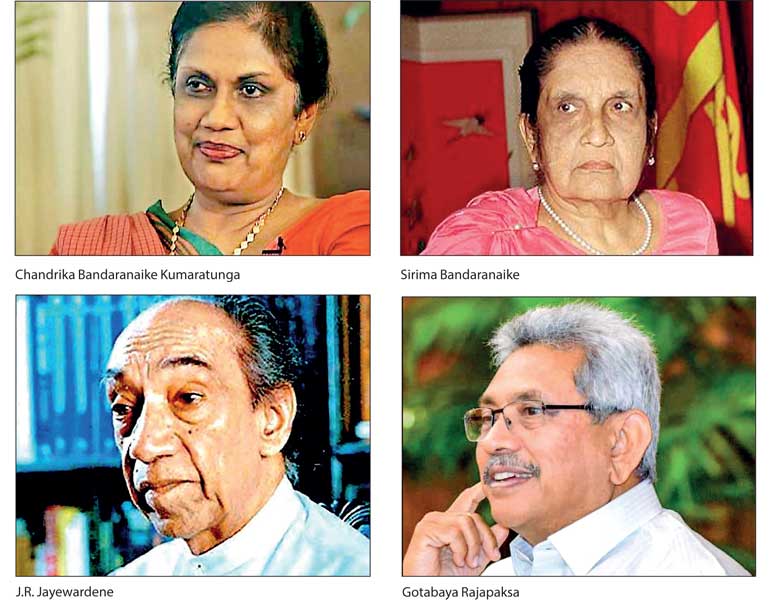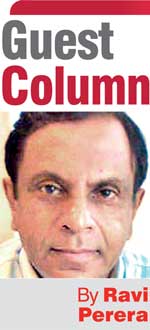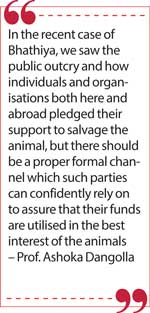Monday Feb 16, 2026
Monday Feb 16, 2026
Thursday, 14 August 2025 00:28 - - {{hitsCtrl.values.hits}}

 “The great theatre of the world has a small personnel. In historic costumes, with the language of various epochs in their mouths, the same figures keep appearing, playing in a few eternal conflicts”
“The great theatre of the world has a small personnel. In historic costumes, with the language of various epochs in their mouths, the same figures keep appearing, playing in a few eternal conflicts”
Our dreary post-independence history seems to be that of a country going round in circles; a lot of posturing, a big noise, but a poor performance. In self-justification, it is argued by some politicians that Sri Lanka had advanced relative to what prevailed in 1948. This claim is undeniably true; we are now not what we were 70 years ago. This would be true of every country on this planet, they have all advanced in these 70 years. However, this comparison is to only our country, in relation to ourselves then in 1948, to now. They don’t compare our progress against countries like Malaysia, Thailand, Vietnam, Singapore or China, the resurgent Asia.
If they were to, the uncomfortable truth will hit them between the eyes, the wretched results of a leadership much wanting. In a dispassionate analysis of our relative progress against these Asian dynamos, we would look like a ramshackle three-wheeler loaded with clueless passengers and a scoundrel for a driver; an embarrassment trudging along on the fast moving Asia highway meant for sleek cars with turbo charge. The passengers don’t seem to know where they want to go, the driver is taking them for a ride. From the looks of it, they would all be delighted to abandon the three-wheeler for a powerful car.
We may be pitied, but not respected.
The economist W.A. Wijewardena in a recent article pointed out that for a poor country to become rich it needs to sustain a growth rate of 8% or more for many years. Our average growth rate from independence until 2024 has been around 4%, Sri Lanka is a low growth country. We notice that a short spike of the economy follows an extremely bad government or political/social upheaval, such as in 1978 (following the 1970-77 government) and the years immediately after the defeat of the LTTE. However, these are not due to good economic leadership, the spikes prove to be short-lived and the country soon goes back to the mean average of 4% or less growth. In 2002, when Chandrika Bandaranaike was president our national economy in fact contracted. That singular mark of economic clowning was repeated 20 years later by the unlamented Gotabaya Rajapaksa.
The show is a flop
 It matters little whether the leader wears a Western attire or the national costume, whether he claims fluency in English or not, whether he is a lawyer or a farmer, the Sri Lankan economy grows only at a measly 4% average. We can amend constitutions, debate kings and cabbages in parliament, lecture various international conferences, yet all these are window dressings, the show is a flop.
It matters little whether the leader wears a Western attire or the national costume, whether he claims fluency in English or not, whether he is a lawyer or a farmer, the Sri Lankan economy grows only at a measly 4% average. We can amend constitutions, debate kings and cabbages in parliament, lecture various international conferences, yet all these are window dressings, the show is a flop.
Statistics post-independence show that we cannot do better than this pathetic 4% average growth rate.
Achieving a Developed Country status is only a fantasy, tantalising to the naïve voter at election times.
We like to pass all culpability to the politicians and the corruption, a blame almost platitudinous today. Unquestionably, these twin evils evolving out of our general culture are largely accountable for the morass we are in.
The vulgarity of our politics and the attendant corruption did not come from another planet, they came from deep within us.
Is the blame game only a convenient unction to our tattered self-image, or, what we want to believe; that we are a nation unusually intelligent, efficient, productive and honest?
A people claiming to possess high virtues when everything about them suggests the opposite, points perhaps to a civilisational conundrum which is not in our power to address.
Leaving these weighty considerations aside, we come back to the apparent repetitiveness in our post-independence history; a drama in which the actors change in every Act, but the plot seems the same.
The writer belongs to an age category who can claim a memory of the heady days of the UNP electoral victory of 1977. It is recorded that 87.1% of the registered voters exercised their vote on 21 July 1977, the election day. The JR Jayewardene-led UNP routed the ruling SLFP Government of Sirima Bandaranaike which had by then become a sorry spectacle. The voter endorsement was unprecedented, the UNP winning more than four-fifths of the seats in Parliament. From commanding more than 100 seats in Parliament, the SLFP were reduced to single digits. The TULF, which in terms of votes represented less than 7% of the total vote won more seats than the SLFP, thus paving the way for its leader Amirthalingam to become the leader of opposition (the SLFP with 29.5 of the vote had less seats).
A nebulous idea
The UNP election campaign pretty much took the form of a battle between good versus evil, Jayewardene committing himself to creating a “Dharmista” society, which translates roughly to a righteous society, a term which in Eastern thought could carry a wider meaning than the English interpretation. It was a nebulous idea, but such things appeal to our voter. Jayewardene and other UNP platform speakers dealt at length with what was represented as immorality, the abuse of the system and corruption by the sitting Bandaranaike Government.
Mrs Bandaranaike’s style of ruling made these accusations plausible; governing much of her period under emergency provisions, she was insular, erratic and nepotistic; a modern State run with a mind-set rural and essentially feudal. Untrammelled power in this small island undid her, kindling an absurd ambition for a global role through the non-aligned movement, a talk shop, alive then. It was unreal, here in her own country the economy tanked, people were looking for a morsel of food even in garbage bins, our Prime Minister wanted to lead an international movement!
Relative to the systemic corruption of today, corruption then was isolated and of a garden variety; a small sum of money, an Indian saree, a comb of banana or even a measure of rice. Following her policies of Statism, the Government became the primary job provider; some UNP speakers referred to SLFP ministers conducting job interviews for female applicants in ‘Rest Houses’. Largish single story lodgings, these were a colonial creation for the travelling colonials; now, after independence, taken over by the native elite and turned into a status symbol where they indulged in the famous Sri Lankan lunch of beef/fish curry, dhal, coconut sambol, and curried vegetables on a copious plate of rice.
The Rest Houses had a few rooms. This claim of female job applicants being interviewed in Rest Houses by elderly ministers of the Government was heavy with the suggestion of improper goings on.
A man on the wrong side of history
That overwhelming electoral victory of 1977 seems to have turned old JR Jayewardene’s head, who began to think of himself as a philosopher King. No one knew what his philosophy was, but there was no ‘Dharmista’ era, a word soon forgotten. One thing was clear, the King did take to opposition kindly. The irony of history, after 1983, in six short years of Jayewardene, he was a leader under siege, a man on the wrong side of history.
 In the early days of the UNP government, tentative, almost comical, attempts at spirituous discipline were considered. Ministers of the SLFP getting drunk at cocktail parties hosted by foreign embassies was slated on the UNP stage. A rule was now brought to limit attendance at such parties, only one minster to represent the Government at the cocktail!
In the early days of the UNP government, tentative, almost comical, attempts at spirituous discipline were considered. Ministers of the SLFP getting drunk at cocktail parties hosted by foreign embassies was slated on the UNP stage. A rule was now brought to limit attendance at such parties, only one minster to represent the Government at the cocktail!
Despite the rhetoric before the elections, there was no serious drive against corruption, a few leaders including Mrs Bandaranaike were found guilty of abuse of power by a special tribunal and deprived of civic rights for a few years.
Jayewardene’s 1978 Constitution brought about a presidential system. With every President the demand for the abolition of this office grows only louder, we simply don’t have the required quality to win legitimacy to such an office.
Jayewardene was pragmatic, he opened up the economy as had been urged by many economists. But it was capitalism with a dirty face, bribery and commissions robbed the system of any credibility; the playing field was not level, back room deals commanded the day. The UNP ministers succumbed to the temptation, they possessed neither the discipline nor the culture of true nation builders.
After the spike of 1978-79, the economy went back to the accustomed 4% growth rate. The tragic events of 1983 was the denouement of a Government which had won such an overwhelming endorsement only six years back.
History repeats, even Chandrika Bandaranaike campaigned and won the presidency in 1994 on a similar platform, challenging a Government she alleged was abusive and corrupt. She claimed to have many files (a charming Sri Lankan reference to evidence of corruption) on powerful individuals. Eventually, it appeared the files were very thin, there was nothing.
So we go; allegations of corruption, followed by an attempt at prosecuting a few by the new Government. They would have us believe that these are oddments, a few individuals who have gone astray. The society itself is wholesome.
Meanwhile the country chugs along, its economy growing at a doleful 4%.